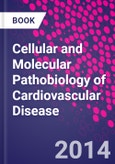Cellular and Molecular Pathobiology of Cardiovascular Disease focuses on the pathophysiology of common cardiovascular disease in the context of its underlying mechanisms and molecular biology. This book has been developed from the editors' experiences teaching an advanced cardiovascular pathology course for PhD trainees in the biomedical sciences, and trainees in cardiology, pathology, public health, and veterinary medicine. No other single text-reference combines clinical cardiology and cardiovascular pathology with enough molecular content for graduate students in both biomedical research and clinical departments.
The text is complemented and supported by a rich variety of photomicrographs, diagrams of molecular relationships, and tables. It is uniquely useful to a wide audience of graduate students and post-doctoral fellows in areas from pathology to physiology, genetics, pharmacology, and more, as well as medical residents in pathology, laboratory medicine, internal medicine, cardiovascular surgery, and cardiology.
Please Note: This is an On Demand product, delivery may take up to 11 working days after payment has been received.
Table of Contents
1. Molecular Basis of Cardiac Development 2. Cardiac Metabolism in Health and Disease 3. Cardiac Atrophy & Remodeling 4. The Pathophysiology of Cardiac Hypertrophy and Heart Failure 5. Ischemic Heart Disease and its Consequences 6. Pathophysiology of Cardiomyopathies 7. Cellular and Molecular Pathobiology of the Cardiac Conduction System 8. Molecular Pathobiology of Myocarditis 9. Calcific and Degenerative Heart Valve Disease 10. Vasculogenesis and Angiogenesis 11. Diseases of Medium-sized and Small Vessels 12. Pathophysiology of Atherosclerosis 13. Genetic Diseases of the Aorta (Including Aneurysms) 14. Blood Pressure Regulation and Pathology 15. Venous and Arterial Thrombosis 16. The Pericardium and its Diseases
Authors
Monte Willis University of North Carolina, Chapel Hill, NC, USA.Monte S. Willis, MD, PhD, MBA is Vice-Chair of Academic Affairs and Associate Professor in the Department of Pathology and Laboratory Medicine at the Univeristy of North Carolina-Chapel Hill. He is Director of Campus Health Services Laboratory and the McLendon Clinical Laboratories and principal investigator in the McAllister Heart Institute, where he leads a research team studying the role of the ubiquitin proteasome system in metabolism and the pathophysiology of cardiac disease (supported by NIH and the Fondation Leducq) and teaches in the School of Medicine and Graduate School. Dr. Willis received his combined MD and PhD training at the University of Nebraska Medical Center. He went on to complete a residency in the Department of Pathology and post-doctoral training in in Burns, Trauma, and Critical Care in the Department of Surgery at the University of Texas Southwestern Medical Center. He has received multiple honors for his research, including the Cotran Early Career Investigator Award from the American Society of Investigative Pathology, and the Jefferson-Pilot Fellowship in Academic Medicine from the University of North Carolina School of Medicine. He is active on the editorial boards of the American Journal of Pathology, Cardiovascular Pathology, Journal of Molecular and Cellular Cardiology, American Journal of Physiology-Endocrine and Metabolism and co-chairs an American Heart Association Study Section. Dr. Willis has published more than 210 manuscripts in clinical, translational, and the basic sciences and edited multiple medical textbooks, including Molecular and Translational Vascular Medicine (2012); Translational Cardiology: Molecular Basis of Cardiac Metabolism, Cardiac Remodeling, Translational Therapies, and Imaging Techniques (2012), and the Cellular and Molecular Pathobiology of Cardiovascular disease (2013).
Jonathon W. Homeister University of North Carolina, Chapel Hill, USA.
Jonathon W. Homeister earned Bachelor of Arts degrees in Biology and Chemistry in 1985 from Hope College, where he began his research endeavors mentored by Christoper C. Barney, Ph.D. He then earned the Doctor of Philosophy in Pharmacology, mentored by Benedict R. Lucchesi, M.D., Ph.D., and the Doctor of Medicine from the University of Michigan in 1993. He received residency training in anatomic pathology at the University of Michigan Hospitals and is a Diplomat of the American Board of Pathology. After residency, he received additional research training as an Associate of the Howard Hughes Medical Institute, mentored by John B. Lowe, M.D. He is currently an Associate Professor in the Department of Pathology and Laboratory Medicine, and member of the McAllister Heart Institute at the University of North Carolina at Chapel Hill, where he is also Director of the Molecular and Cellular Pathology Graduate Program. His clinical interests include cardiovascular, autopsy, and forensic pathology, and his research interests focus on the glycobiology inherent to leukocyte trafficking, with particular respect to the pathogenesis of cardiovascular diseases including atherosclerosis and thrombosis.
James Stone Harvard Medical School, Boston, MA, USA.
Dr. Stone graduated summa cum laude from Wabash College with a B.A. in chemistry. He then completed the Medical Scientist Training Program at the University of Michigan where he earned both an MD and a PhD in Biological Chemistry. His doctoral thesis research was performed in the laboratory of Prof. Michael A. Marletta, where he purified and characterized the sensor for nitric oxide, the soluble form of guanylate cyclase.
Dr. Stone completed the Anatomic Pathology Residency Program at Brigham and Women's Hospital and Harvard Medical School. Dr. Stone completed clinical fellowship training in Cardiovascular Pathology at BWH under Prof. Frederick Schoen. He also completed post-doctoral research on endothelial cell biology in the Vascular Research Division at BWH and at Children's Hospital with Prof. Tucker Collins.
Dr. Stone is currently Head of the Cardiovascular Pathology Service and Director of the Autopsy Service at Massachusetts General Hospital. He is also an Associate Professor of Pathology at Harvard Medical School. Dr. Stone directs a research laboratory in the Center for Systems Biology at MGH studying mechanisms underlying cardiovascular diseases. His group has particular focus on vascular cell activation, vasculitis and atherosclerosis, and on bridging the gap between model systems and human cardiovascular diseases.








